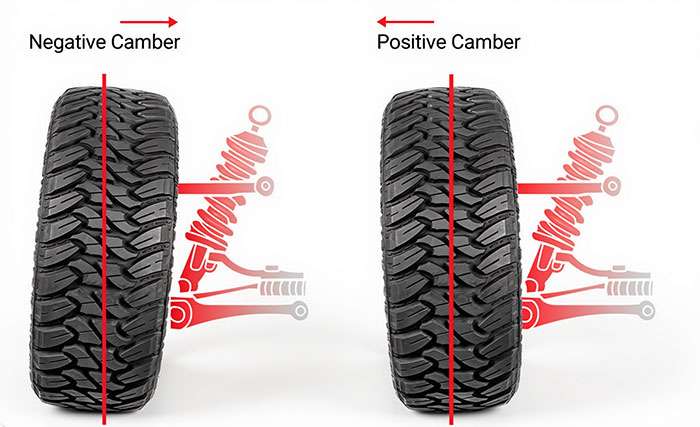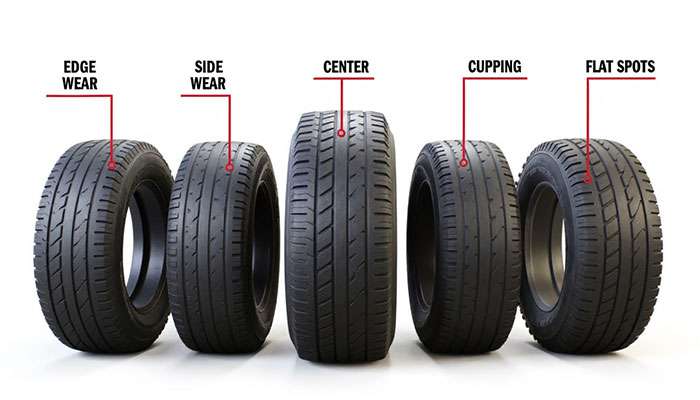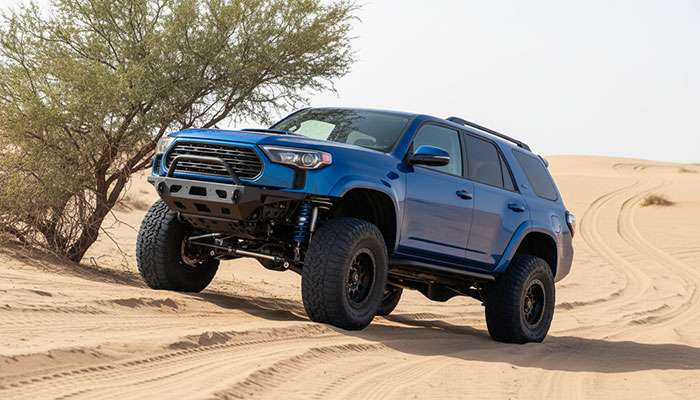
Does off-roading mess up your alignment? Absolutely. Off-road driving is the most common cause of alignment problems in 4x4 vehicles. When you take your truck or SUV through rough terrain, rocks, and challenging trails, you're putting serious stress on your vehicle's suspension and steering components.
Proper alignment keeps your vehicle tracking straight down the road without pulling to either side. Your tires wear evenly, your fuel economy stays optimal, and your ride quality remains smooth. Take that same vehicle off-road, and alignment issues become inevitable. Serious off-road enthusiasts who hit the trails regularly need frequent alignment checks to keep their rigs performing properly. Ignore alignment problems too long, and you'll face harder steering, poor handling, and potential issues with your vehicle's safety systems.
At Performance Plus Tire, we understand the challenges that come with off-road adventures. Our experience with countless 4x4 builds has shown us exactly how trail riding affects vehicle alignment, what warning signs to watch for, and the specific factors that throw your wheels out of spec during off-road excursions.

Off-road driving puts constant stress on your vehicle's alignment through three key measurements: camber, toe, and caster. Every rock impact, rut, and uneven surface gradually shifts these wheel angles away from their optimal settings. What starts as minor adjustments compounds over time, eventually creating noticeable handling problems.
Most off-road enthusiasts run larger tires, lift kits, and upgraded suspension components that change their vehicle's geometry significantly. Factory alignment specifications no longer apply to these modified setups. These modifications also increase unsprung weight, placing additional stress on steering and suspension components that makes them more prone to alignment shifts.
The Society of Automotive Engineers reports that modified vehicles driven off-road lose proper alignment twice as fast as stock vehicles on pavement. Each trail impact gradually knocks your wheel angles further out of specification, accelerating the deterioration process.
Misaligned wheels create serious performance and safety issues. You might experience death wobble at highway speeds, excessive tire scrubbing, or poor steering response when you need it most on challenging terrain. For overlanders covering long distances, misalignment destroys expensive all-terrain tires and reduces fuel economy significantly.
Minor alignment problems affect your vehicle's safety and handling characteristics. Trail-induced misalignment causes uneven traction between wheels, unpredictable steering response, and accelerated wear on both tires and suspension components. This wear pattern increases the risk of component failure during critical moments on the trail.
Understanding how off-road driving affects alignment helps you recognize problems early and maintain your vehicle's performance for safer, more enjoyable adventures.

Your truck or SUV tells you when something's wrong after a tough trail ride. Catching alignment problems early saves you money on expensive tire replacements and keeps you safe on and off the pavement.
Vehicle pulling to one side is the most obvious red flag. You'll notice it immediately - your steering wheel wants to drift left or right even on straight roads. Your steering wheel might also sit crooked when your wheels are pointing straight ahead. This happens frequently after hitting rocks or navigating challenging terrain.
Uneven tire wear patterns provide clear evidence of alignment issues. Look for excessive wear on the inside or outside edges of your tires - this indicates camber problems that can cut tire life in half.
Additional warning signs include:
Steering wheel vibrations, especially at highway speeds
Rough ride quality on roads that used to feel smooth
Tire squealing during normal turns
Misaligned wheels can reduce your fuel efficiency by up to 10%, which adds up fast during long off-road trips. Quality off-road wheels from Performance Plus Tire are built to maintain better alignment even through demanding terrain.
If your vehicle tracked perfectly straight before your off-road adventure but now wanders or feels unstable above 60 mph, trail impacts have knocked your alignment out of spec.

Off-road driving creates the perfect storm for alignment problems. The question isn't whether your alignment will be affected, but how quickly and severely.
Uneven terrain puts your suspension through constant stress. Every rock, rut, and washout forces your wheels to work at angles they weren't designed for. Your suspension components absorb these impacts, but over time, the repeated stress gradually shifts your wheel angles out of specification.
Hard impacts deliver immediate damage to your alignment. Hit a hidden rock or land hard after catching air, and you can instantly knock your wheels out of alignment. These sudden jolts shock your steering components and can bend or shift parts in ways that show up immediately in your vehicle's handling.
Constant vibration from rough trails creates another problem entirely. The continuous shaking gradually loosens bolts, bushings, and fasteners throughout your suspension system. What starts tight from the factory slowly works loose over miles of trail riding.
Age makes everything worse. Worn suspension components like ball joints, bushings, and control arms naturally develop play over time. Off-road driving accelerates this wear dramatically, allowing your wheel angles to shift more easily with each trail impact.
Suspension modifications change the game completely. Lift kits and upgraded shocks alter your vehicle's geometry in ways that factory alignment specs can't accommodate. Without proper post-installation alignment, these modifications almost guarantee problems.
Your tires play a role too. Off-road tires wear unevenly on challenging terrain, creating imbalances that affect alignment. At Performance Plus Tire, we carry off-road wheels designed to handle tough conditions while maintaining better alignment stability.
AAA reports Americans spend over $3 billion annually on pothole-related repairs, with many tied directly to alignment issues. Every off-road adventure gradually shifts your vehicle's alignment, making regular professional checks essential for serious trail riders.
Off-road driving will throw your vehicle's alignment off - it's simply part of the adventure. Every trail ride puts stress on your suspension components, from hard impacts with rocks to the constant vibration that gradually loosens bolts and fasteners. The question isn't whether off-roading affects alignment, but how quickly you address the issues when they arise.
Regular alignment checks after serious trail rides should be standard maintenance for any off-road enthusiast. Your modified suspension, larger tires, and aggressive driving style make alignment problems more likely and more severe than stock vehicles experience on pavement. Catching alignment issues early saves money on tire replacements and prevents dangerous handling problems.
Those expensive lift kits and off-road wheels you've installed actually make your vehicle more susceptible to alignment shifts. Factory specifications don't apply to modified rigs, so you need professionals who understand how to properly align lifted trucks and SUVs with oversized tires.
At Performance Plus Tire, we work with off-road enthusiasts who understand that trail-ready vehicles require different maintenance schedules than daily drivers. Our off-road wheel selection is designed to withstand the punishment of rough terrain while maintaining proper fitment specifications. Regular alignment checks keep your rig performing safely both on the trail and during highway driving.
The cost of periodic alignment services is minimal compared to replacing a full set of expensive all-terrain tires or dealing with suspension failure miles from civilization. Keep your off-road adventures fun and safe by treating alignment maintenance as seriously as you treat your vehicle modifications.
Off-roading inevitably affects your vehicle's alignment, but understanding the impacts helps you maintain safety and performance while enjoying trail adventures.
Off-roading definitely messes up alignment - it's the most common problem from 4-wheeling, with modified vehicles losing alignment twice as fast as stock vehicles.
Watch for key warning signs: vehicle pulling to one side, uneven tire wear patterns, off-center steering wheel, vibrations, and reduced fuel efficiency up to 10%.
Hard impacts from rocks, ruts, and obstacles cause immediate alignment shifts, while constant vibration gradually loosens suspension components over time.
Suspension modifications like lift kits and larger tires make vehicles more susceptible to alignment issues and require adjusted specifications beyond factory settings.
Regular alignment checks after trail rides are essential maintenance - addressing issues promptly prevents expensive tire replacements and dangerous handling problems.
Treating alignment maintenance as part of your off-road routine ensures your 4x4 remains capable and reliable for future adventures, rather than becoming a costly burden of continuous repairs.
Yes, off-roading frequently causes alignment problems. It's one of the most common issues resulting from 4-wheeling, as the rough terrain and impacts can gradually shift wheel angles out of their optimal positions.
Common signs include your vehicle pulling to one side, uneven tire wear, an off-center steering wheel when driving straight, vibrations while driving, and reduced fuel efficiency.
If you often engage in off-road activities, it's advisable to check your alignment after significant trail rides. Regular checks can prevent more serious issues and save money on premature tire replacements.
Yes, suspension modifications like lift kits can dramatically change wheel angles. These upgrades often require adjustments beyond factory alignment specifications and can make your vehicle more susceptible to alignment issues.
While it's not typically necessary after every trip, frequent alignment checks are recommended for off-road enthusiasts. The need for alignment depends on the intensity of your off-roading, the condition of your vehicle, and how you drive on rough terrain.